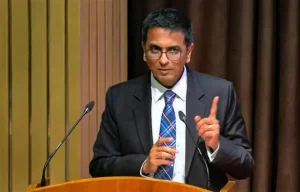CJI Chandrachud says new criminal laws signify watershed moment for society

Chief Justice of India DY Chandrachud on Saturday said the country was set for a significant overhaul of its criminal justice system with the upcoming implementation of three new criminal laws.
He said these laws signified a watershed moment for the society because no law affected the day-to-day conduct of the society like the criminal law. He added that criminal law directed the moral arc of a nation and had the ability of depriving people of their cherished liberties.
The underlying justification for the substantive provisions was the age-old harm principle which is best summarised in the saying, ‘Your right to swing your arms ends just where the other man’s nose begins.’
As per the CJI, the procedural law which governed crimes from the state of setting the criminal process in motion to the conviction for the commission of the offence ensured that no person was charged and subsequently convicted for offences without following the due process of law.
The traditional harm principle has found resonance with the understanding that crime is immoral. The father of criminology, Raffaele Garofalo defined crime as “an immoral and harmful act that is regarded as criminal by public opinion because it is an injury to so much of the moral sense as is possessed by a community – a measure which is indispensable for the adaptation of the individual to society.”
The ideals underpinning the combination of harm and immorality were premised on the perception that deprivation of liberty leads to repentance and moral salvation, he added.
The Bharatiya Nyaya Sanhita, Bharatiya Nagarik Suraksha Sanhita, and Bharatiya Sakshya Adhiniyam would replace the Indian Penal Code 1860, the Code of Criminal Procedure 1973 and the Indian Evidence Act 1872 respectively
from India Legal https://ift.tt/2ixJnMD